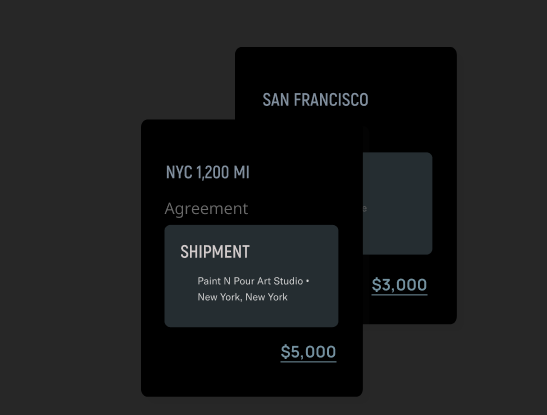Freight Broker 101
December 22, 2024 2025-04-07 17:53Freight Broker 101
LEARN HOW TO BE A SUCCESSFUL FREIGHT BROKER
Online training you can do anywhere–and at your own pace.
VIDEO, AUDIO, AND TEXT LESSONS
Learn Better with 1-ON-1 Support
100% Online Interactive Course
Sign Up For Easy Online Program
LEARN HOW TO BE A SUCCESSFUL FREIGHT BROKER
Online training you can do anywhere–and at your own pace.
VIDEO, AUDIO, AND TEXT LESSONS
LEARN BETTER WITH 1-ON-1 SUPPORT
START YOUR OWN BUSINESS
SIGN UP FOR EASY ONLINE PROGRAM
Why be a Freight Broker?
The freight brokerage market is a global, multi-billion dollar industry with projected annual growth of 5% up to 2028.* And no wonder. As long as people buy and sell goods, those items will need to be shipped.
Now there’s a way to earn your share of all that profit by arranging lower-cost transportation services while taking a commission on each load–and we can show you how.

Take charge of
your career
Be your own boss and work on your terms. You’ll get out what you put in.

Earn from
day one
It’s not unusual for freight brokers to earn $80K or more in their first year.*

Work
anywhere
From home or a café or anywhere in the world. Be a true digital nomad.

A great add-on
service
If you operate trucks, this is a great field to diversify into.
Everything you need to build your own brokerage

LEARN IN STAGES
Each lesson builds on the one before, gradually increasing your confidence and competence while providing a clear path to success.

TOOLS AND TEMPLATES
We'll provide all the practical tools you need, including templates for websites, business plans, contracts, and invoicing. So, you can get started right away on building solid, repeatable business.

OUR JOB BOARD
We'll even help you find customers. Our Job Board is exclusive to our members and offers a range of opportunities to profit from your new learnings.

COMMUNITY SUPPORT
You will also have access to our helpful community of like-minded business owners, ready and willing to help out with any questions about your day-to-day experiences as a freight broker.
Everything you need to build your own brokerage
LEARN IN STAGES
Each lesson builds on the one before, gradually increasing your confidence and competence while providing a clear path to success.

TOOLS AND TEMPLATES
We’ll provide all the practical tools you need, including templates for websites, business plans, contracts,and invoicing. So, you can get started right away on building solid, repeatable business.

OUR JOB BOARD
We’ll even help you find customers. Our Job Board is exclusive to our members and offers a range of opportunities to profit from your new learnings.

COMMUNITY SUPPORT
You will also have access to our helpful community of like-minded business owners, ready and willing tohelp out with any questions about your day-to-day experiences as a freight broker.

From learning to earning
in as little as 6 weeks

FULLY ONLINE LEARNING
Video-supported modules for effortless learning.
It’s more than just reading. With video support, you can quickly grasp key concepts for a more dynamic and engaging learning experience.
EXPERT SUPPORT
Enhance your learning with personal guidance from industry experts.
Let the experts show you how, with tailored support when you need it.


GET SET UP
Launch your business and turn a profit right away
The freight business never sleeps. So, once you’ve completed the course and set yourself up, you can start generating income immediately.
Introducing the team behind your freight brokering journey

Your mentor
Accelerate your know-how with your dedicated mentor. They’ll maintain your focus and share first-hand insider knowledge and experience.

The industry expert
Gain real insights into how the industry works, along with the best practices that can take your brokerage business forward.

the community
Draw on the support of like-minded peers and play your part in supporting each other’s success.
What Our Students
Are Saying
Scott Nichols
Owner, TRO.LLCZach Powell
Founder, My Truck and MeObi Nuru
President“I never would have imagined myself running my own freight agency. But everything was so well explained and the tools and templates got me up to speed really fast. This course has been life-changing.”
Scott Nichols
Owner, TRO.LLC
“I’d never even heard of this business, but it made total sense once I saw how it worked and this program makes everything so manageable.”
Zach Powell
Founder, My Truck and Me
“I thought I’d start it as a side hustle… then I realized I just didn’t need my job anymore because this was so much more flexible. Really can’t thank my course mentors and fellow students enough.”
Obi Nuru
Co-Founder, New Horizons
How we compare with
competitor course providers
FEATURES
FREIGHTBROKER 101
FREIGHT BOOTCAMP
FREIGHT DEGREE
Log in from any location and complete the modules in your own time. Set-up is hassle-free.
If you like to do things your way or have other commitments to consider, you’re free to progress at a pace that suits you.
Integrated video support enables you to quickly grasp key concepts and enjoy a more immersive learning experience.
Your own mentor plus access to industry experts and a supportive community who can answer any questions that arise.
Once you’ve finished you’ll also get a completion certificate to show your credentials.
or $55/month for 6 months
How we compare with competitor course providers
EVERYTHING IS ONLINE
Log in from any location and complete the modules in your own time. Set-up is hassle-free.
Freight Broker 101
Freight Broker Bootcamp
Freight Degree
FLEXIBLE PROGRESS
If you like to do things your way or have other commitments to consider, you’re free to progress at a pace that suits you.
Freight Broker 101
Freight Broker Bootcamp
Freight Degree
VIDEO SUPPORTED MODULES
Integrated video support enables you to quickly grasp key concepts and enjoy a more immersive learning experience.
Freight Broker 101
Freight Broker Bootcamp
Freight Degree
PERSONAL GUIDANCE AND SUPPORT
Your own mentor plus access to industry experts and a supportive community who can answer any questions that arise.
Freight Broker 101
Freight Broker Bootcamp
Freight Degree
CERTIFICATE OF COMPLETION
Once you’ve finished you’ll also get a completion certificate to show your credentials.
Freight Broker 101
Freight Broker Bootcamp
Freight Degree
PRICE
Freight Broker 101
$280
Freight Broker Bootcamp
$699
Freight Degree
$15000+
What our students are saying

Scott Nichols
Scott Nichols
“I never would have imagined myself running my own freight agency. But everything was so well explained and the tools and templates got me up to speed really fast. This course has been life-changing.”

Zach Powell
Zach Powell
“I’d never even heard of this business, but it made total sense once I saw how it worked and this program makes everything so manageable.”

Obi Nuru
Obi Nuru
“I thought I’d start it as a side hustle… then I realized I just didn’t need my job anymore because this was so much more flexible. Really can’t thank my course mentors and fellow students enough.”
A complete learning plan
Discover the essential skills of freight brokering in this nine-part course.
SECTION 1
INTRODUCTION
An overview of freight brokerage and why this is a great time to get started in this business.
SECTION 2
WHO’S WHO
IN FREIGHT
What freight brokers do and how they work with shippers, receivers, and motor carriers.
SECTION 3
FREIGHT BUSINESS ESSENTIALS
The essentials of brokerage operations, including types of transportation modes and their strategic applications.
SECTION 4
ATTRACTING AND RETAINING CLIENTS
Techniques for building a robust client base and maintaining healthy business relationships.
SECTION 5
FREIGHT TYPES AND EQUIPMENT
Get to know the types of freight and equipment involved so you can handle transactions confidently.
SECTION 6
OPERATIONAL
EFFICIENCY
Learn how to optimize logistics so you can provide an efficient, reliable service.
SECTION 7
SOURCING FREIGHT LOADS
Effective strategies you can use to locate and secure loads for transport.
SECTION 8
BOOKING YOUR FIRST LOAD
Walking you through the process of securing and managing your first freight load.
SECTION 9
GROWING YOUR BROKERAGE BUSINESS
Advanced strategies for scaling your operations and increasing profitability.
SECTION 10
EXTRA SERVICES, COMPENSATION AND MARKETING
How to market your business and diversify to provide extra value to your clients.
Why Choose Us?
Six reasons to sign up for freightBroker 101
MONEY-BACK GUARANTEE
There’s no risk. If you’re not completely satisfied, you can claim a full refund within 30 days.
EARN BACK YOUR INVESTMENT
You can recover your investment quickly. One brokered freight is often all it takes, and then you’re up and running.
DEDICATED SUPPORT
Our team is standing by to provide you with prompt, personalized help.
CERTIFICATE OF COMPLETION
Complete the course and you will receive a certificate to validate your new skills and enhance your credibility.
HELPFUL TOOLS AND TEMPLATES
You’ll get essential documents, templates, and other resources to run your business efficiently.
LIFETIME ACCESS TO THE COURSE
No need to rush. You’ll have permanent access to the entire course and can learn at your own pace.
$3,000+
Average Weekly Income
14,000+
Enrolled Students so far
92%
Course Success Rate
9 out of 10
Students Endorse the Course
Our impact by numbers
20+ Years
freight industry experience
14,000+
Enrolled Students so far
92%
Course Success Rate
9 out of 10
Students Endorse the Course
24/7
Student Support
30+
Student Support
Got a question?
What kind of knowledge will I gain by taking this course?
You’ll learn everything you need to profit from a booming multi-billion dollar industry. As well as a broad overview of your role as a freight broker, you’ll get practical tips on minimizing startup costs and applying for licenses—plus all the tools you need to keep your business running smoothly.
You’ll discover plenty of finance tips to give you the edge over the competition, such as managing credit, factoring invoices, negotiating with carriers, and finding niche markets. You’ll also acquire valuable skills with wider application such as customer management. Everything is carefully explained step-by-step as you gradually build your knowledge.
How much can a freight broker earn?
It’s all down to how much work you put in. But, on average, freight brokers in the USA earn $72,000 per year, while more experienced workers make up to $107,500.**
Why is Freight Brokering Such a Good Career?
The truth is people buy and sell a whole range of goods every day, all of which need to be transported. And once you’ve done the training, you can earn a commission on some of that transportation. This is your chance to be part of a booming industry currently valued at $51.7 billion* and growing—a business you can run on your own or with a partner or spouse.
Who can take this course? What are the requirements?
No specialized experience or industry background is required. We’ll supply all the knowledge and materials you need. With plenty of hard work, anyone can earn a good living as a freight broker.
Can I truly do this course anywhere?
All you need is an internet connection and you’re ready to apply what you’ve learned in this course. You can do it in your kitchen, at a local café or even at a beach resort. It’s up to you.
What if your course is not right for me?
Our money-back guarantee means there’s no risk. If you’re not completely satisfied with the materials, you have 30 days to claim a full refund. No questions asked.
*https://www.gminsights.com/industry-analysis/freight-brokerage-market
** talent.com
Any other questions?
Still have questions? We’d love to help! Just reach out to our friendly team.
